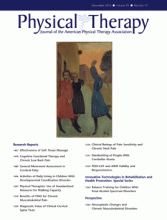Abstract
Background Diminished sensory adaptation has been associated with poor balance control for children with fetal alcohol spectrum disorders (FASD). A virtual reality system, Sensorimotor Training to Affect Balance, Engagement and Learning (STABEL), was developed to train sensory control for balance.
Objectives The purpose of this study was to examine the STABEL system in children with FASD and children with typical development (TD) to (1) determine the feasibility of the STABEL system and (2) explore the immediate effects of the STABEL system on sensory attention and postural control.
Design This is a technical report with observational study data.
Methods Eleven children with FASD and 11 children with TD, aged 8 to 16 years, completed 30 minutes of STABEL training. The children answered questions about their experience using STABEL. Sensory attention and postural control were measured pre- and post-STABEL training with the Multimodal Balance Entrainment Response system and compared using repeated-measures analysis of variance.
Results All children engaged in game play and tolerated controlled sensory input during the STABEL protocol. Immediate effects post-STABEL training in both groups were increased postural sway velocity and some changes in entrainment gain. Children with FASD showed higher entrainment gain to vestibular stimuli. There were no significant changes in sensory attention fractions.
Limitations The small sample size, dose of STABEL training, and exploratory statistical analyses are study limitations, but findings warrant larger systematic study to examine therapeutic effects.
Conclusions Children completed the training protocol, demonstrating the feasibility of the STABEL system. Differences in postural sway velocity post-STABEL training may have been affected by fatigue, warranting further investigation. Limited immediate effects suggest more practice is needed to affect sensory attention; however, entrainment gain changes suggest the STABEL system provoked vestibular responses during balance practice.
Footnotes
Dr McCoy, Dr Jirikowik, Dr Ciol, Dr Dellon, and Dr Kartin provided concept/idea/project design. Dr McCoy, Dr Jirikowik, Mr Price, Dr Ciol, Dr Hsu, and Dr Kartin provided writing. Dr McCoy, Dr Jirikowik, Dr Hsu, and Dr Kartin provided data collection. Dr McCoy, Dr Jirikowik, Mr Price, Dr Ciol, Dr Hsu, and Dr Kartin provided data analysis. Dr McCoy, Dr Jirikowik, and Dr Hsu provided project management. Dr McCoy and Dr Jirikowic provided fund procurement and administrative support. Dr McCoy and Mr Price provided facilities/equipment. Dr Ciol provided consultation (including review of manuscript before submission). The authors gratefully appreciate the children and families who participated.
The study was reviewed and approved by the University of Washington Institutional Review Board.
This project was supported by awards R21AA019579 and R33AA019579 from the National Institute on Alcohol Abuse and Alcoholism. The content is solely the responsibility of the authors and does not necessarily represent the official views of the National Institute on Alcohol Abuse and Alcoholism. The study sponsors had no involvement in the study design; the collection, analysis, and interpretation of data; the writing of the manuscript; or the decision to submit the manuscript for publication.
- Received March 5, 2015.
- Accepted June 11, 2015.












